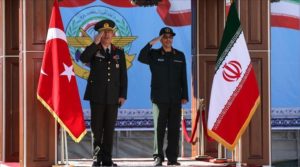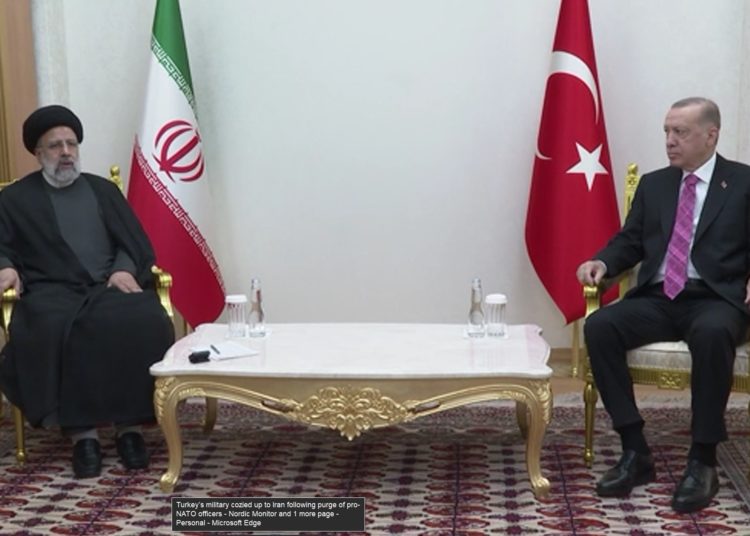Abdullah Bozkurt/Stockholm
More evidence has emerged confirming close military cooperation between the pro-Iranian government of Turkish President Recep Tayyip Erdoğan and the mullah regime in Iran in providing arms to Islamists in Libya.
According to a report submitted by experts to the UN Security Council, arms manufactured by Iran ended up in Libya with the help of the Turkish government, which is ruled by the Islamist Justice and Development Party (AKP), staffed by pro-Iranian figures. The evidence suggests closer cooperation in recent years between the Turkish and Iranian militaries and state-run defense contractors.
Turkish-backed armed factions in the Libyan National Accord (GNA) government received a Dehleyvah anti-tank guided missile (ATGM) system as well as a Misagh-2 man portable air defense system (MANPADS), both of which were manufactured in Iran. In their assessments on March 2021, the Panel of Experts on Libya said it believed it was Turkey that supplied Iranian-made weapons to Libyan factions in clear violation of UN sanctions.
UN investigators believe Iranian arms ended up in Libya with Turkey’s help:
Citing intelligence obtained from a source, the UN experts said Misagh-2 MANPADS were supplied to Turkey by Iran in 2018/2019. The intelligence was corroborated by a photo in the UN report that showed a man in Turkish military uniform holding a MANPADS. Similarly, an infographic developed by UN investigators concluded that Dehleyvah ATGMs were spotted in the possession of armed groups affiliated with the GNA.
The cooperation between Turkey and Iran in defense and military matters was given a major boost in the aftermath of a 2016 false flag coup attempt that led to the removal of nearly all pro-NATO flag officers from the Turkish Armed Forces.
Nordic Monitor previously published classified military notes that revealed how Turkey’s former generals rejected Iran’s diplomatic initiatives aimed at improving bilateral relations before 2016.
Iranian arms in Libya in violation of a UN Security Council resolution were documented by the UN:
According to the documents, dated May 31, 2016, the Iranian defense attaché in Ankara conveyed a request from Ebrahim Taherianfard, ambassador of Iran to Turkey at the time, to be received by then-Chief of General Staff Gen. Hulusi Akar; however, the request from the Iranian Embassy was declined by the planning and principles department of the Turkish General Staff.
The documents indicated that the Iranian Embassy, despite repeated diplomatic démarches, was unable to obtain a positive response from the then-head of the department, Lt. Gen. Salih Ulusoy, since the Turkish ambassador in Tehran had not been received by the chief of the Iranian general staff. Ironically, Lt. Gen. Ulusoy was well aware of the fact that the Turkish ambassador, according to the document, had not sought an appointment with the Iranian military chief in Tehran.

Following the coup attempt, Lt. Gen. Ulusoy was dismissed from his position and arrested on dubious terrorism charges as a result of an unprecedented purge of flag officers from the Turkish military. Nordic Monitor previously reported that only 42 Turkish generals and admirals out of the 325 who were on active duty at the time have managed to retain their rank or receive promotions.
Since 2016 the Turkish commanders were replaced by Islamists and neo-nationalists bent on undermining the NATO military alliance and pivot Turkey away from the transatlantic alliance and shift its geopolitical direction.
Despite President Erdoğan’s ties to Iran’s Islamic Revolutionary Guard Corps (IRGC) generals and the country’s increasing role in Turkey’s National Intelligence Organization (MIT), run by pro-Iranian figure Hakan Fidan, the Turkish military had managed to resist the government’s overtures with Iran until 2016. The massive purge of pro-NATO elements from military positions of power in 2016/2017 period was a welcome development from Iran’s perspective.
UN experts’ findings on violations by Iran, which sent arms to Libya in violation of a UN resolution:
In August 2017 the then-spokesperson of the Iranian foreign ministry, Bahram Qassemi, stated that the abortive putsch had facilitated the beginning of a détente in bilateral relations between Ankara and Tehran, saying: “Iran’s support for Turkey following the coup attempt brought a new season in bilateral relations. … We conveyed that Iran was ready to meet any requests from Turkey.”
Rapprochement between Turkey and Iran reached its height when Iranian Gen. Bagheri was welcomed by his Turkish counterpart, Hulusi Akar, in Ankara in August 2017. The visit of Gen. Bagheri was the first such visit since the 1979 revolution, an event that speaks for itself regarding its meaning for both sides. In addition to Akar, Bagheri met with President Erdoğan and the Turkish defense minister during a three-day program that became a cornerstone of Turkey-Iran military relations.
Two months later, Gen. Akar visited Tehran for talks with Bagheri as regional measures against the Kurdistan Regional Government (KRG) in northern Iraq intensified following an independence referendum in September 2017.
The UN report concluded that Iran and Turkey violated the UNSC resolution by supplying weapons to factions in Libya:
Furthermore, Iran’s military chief of staff Gen. Bagheri paid his second visit to Turkey in January 2019 for “unprecedented” talks with Turkey’s leadership reportedly aimed at narrowing differences on the Syria crisis and coordinating policy on Iraq. The Turkish side described the visit as a “milestone,” and it was defined as “unprecedented in the history of bilateral relations” by Iranian officials.
Evidence concerning the 2016 coup attempt seemed to confirm the widely circulated allegations that Akar had in fact been working with Turkish intelligence chief Fidan and President Erdoğan to stage a false flag in order to create a pretext for an unprecedented mass purge of military officers.
An investigation, called Tawhid Salam (Tevhid Selam in Turkish), which was launched by Turkish prosecutors in 2011, uncovered a sophisticated espionage network run by the IRGC’s Quds Force in Turkey and exposed the extent and depth of infiltration in Turkish institutions by Iranian elements. The investigation also revealed Erdoğan’s secret ties to IRGC generals and how Fidan’s MIT worked with the Iranian regime.
Erdoğan, who calls Iran his “second home,” has allowed this terrorist network to act with impunity in NATO alliance territory despite the fact that the spy ring has violated several Turkish penal code articles, from terrorism to espionage.












